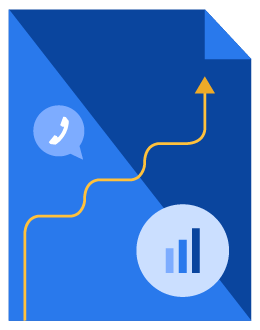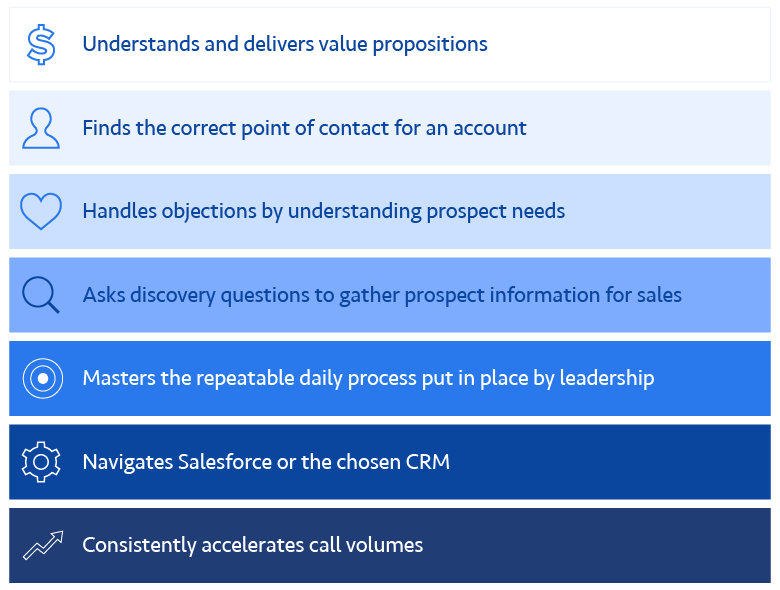What to Look for When Hiring SDRs


Tim Edwards
This post was originally published in February 2019 and has been updated for accuracy and comprehensiveness.
Having difficulty hiring Sales Development Reps (SDRs)? You’re not alone: even the most successful sales companies report struggling with high turnover rates and a lack of candidates for SDR roles. Though difficult, hiring and retaining a strong SDR team is not impossible. It requires efficiency, consistency, and proactivity in your approach.
At EBQ, we’ve spent over a decade creating an efficient SDR hiring process and team structure for both our internal sales team as well as hundreds of clients across various industries. Now, we are sharing this knowledge with you.
This blog will discuss the ideal SDR candidate, how to approach the hiring process, and the keys to ensuring a successful SDR team as you build your sales pipeline and drive revenue for your business.

Download the SDR Metrics E-Book
Save our list of the best metrics for sales development. Read at your convenience and use them as a reference for your team.
The Ideal SDR Candidate
Just like sales teams build an ideal customer profile for prospects, you’ll want to start by creating an ideal candidate profile for potential SDR hires. It is important to look for the following traits to discover candidates that will find success in the role and stay with your company for the long term.
Personality
Whether your sales development reps qualify cold leads, inbound leads, or both, they will always face the possibility of rejection. This is a reality of the position, and it’s the reason that hiring managers must consider personality when building their SDR team.
Confidence, ambition, and resolve are just a few of the key personality traits that hiring managers should look for in SDR candidates. They must be comfortable speaking on the phone all day, handle rejection gracefully, and know how to keep a conversation moving forward despite opposition. They must also remain committed to their company’s business goals throughout the appointment setting process.
Experience
The amount of experience required to become an SDR dwindles each year, and as a result, more and more companies have started to outsource this role. A shortage of experienced sales development reps can further complicate the process of choosing a SDR candidate for your team.
SDR roles are entry-level positions, so experience is not necessarily one of the most important factors in choosing a candidate. On the other hand, success in a similar role can indicate a candidate’s ability to cold call and qualify leads without experiencing burnout. Often, candidates with a background in the service industry or customer experience enjoy success as SDRs due to their knowledge of working with both satisfied and unsatisfied customers.
Ultimately, any person with the right mindset and a willingness to learn can find success as a sales development rep. However, it is the hiring manager’s responsibility to provide adequate training and establish a day-to-day process to support their SDR team.
Skills
Many of the skills for an ideal SDR candidate mirror the personality traits mentioned above. Hiring managers should look for candidates who can speak with prospects, genuinely listen, and understand their needs. However, there are certain “hard skills,” like experience with CRM software and desktop phone applications, that are advantageous when looking at SDR candidates. The graphic below outlines top skills that we look for during the hiring process:

- Understand and deliver value propositions
- Find the correct point of contact for an account
- Handle objections by understanding prospect needs
- Ask discovery questions to gather prospect information for sales
- Master the repeatable daily process put in place by leadership
- Navigate Salesforce or the client’s chosen CRM
- Consistently accelerate call volumes

Subscribe to EBQ's Bimonthly Newsletter

Subscribe to EBQ's Bimonthly Newsletter
What to do when hiring SDRs
Attract Applicants
Here in Austin, we are fortunate to have a thriving pool of sales and marketing professionals from which we can build our SDR team. But no matter the job market, your job listing must accurately describe the position and set clear expectations for candidates.
As mentioned above, SDRs must make lots of cold calls and face rejection from prospects. Not everyone will be a good fit for this position, so it’s important to let candidates know what to expect early on. Not only will you find the most ideal candidates this way, but you’ll also avoid wasting recruitment resources and turnover if a candidate is a bad fit.
Interview and Selection Process
At EBQ, we start by screening SDR candidates with a phone interview to ensure that they are a good fit for the role. If we determine a candidate is a good fit, we then schedule an in-person interview to delve further into their skills, asking questions that allow them to demonstrate knowledge and aptitude towards the role and our company.
A key tenet of our interview process is asking questions without revealing our intent. For example, we may ask “why do you want to work at EBQ?” to see if the candidate has researched our company. This can be a telling appraisal of an SDR candidate.
Once you’ve narrowed down your final candidates, you’ll want to return to the personality traits outlined above. This will help you determine if they are compatible with the day-to-day duties of a sales development rep, and will also indicate their desire for success for both themselves and your business.
Throughout the process, you should determine the criteria that are most important for your company. It gives you a consistent scale against which to measure SDR candidates and ensure that whoever you choose resonates with your business goals. Among others, we commonly prioritize motivation, confidence, and intellect.
Create an efficient SDR hiring process
Above all else, your hiring process should be efficient and replicable to avoid understaffing and underperformance. At EBQ, our hiring process never ends: we are constantly recruiting and interviewing new SDR candidates to ensure that, if the need arises, we can quickly onboard a new, qualified candidate. It has proven successful, as sometimes we must provide an SDR team at a week’s notice. It also allows us to place new sales development reps on projects that are suited to their specific skillset.
A properly staffed SDR team is a fully optimized SDR team. By constantly bringing on new team members, we can ensure that we are qualifying leads and setting sales appointments as often as possible while avoiding excessive downtime, which drains valuable resources. We continuously monitor other reasons to expand our team, such as an increase in clients, new sales reps, or increased revenue goals.
Our continuous hiring approach is unorthodox: many companies choose to onboard SDRs in groups and then retain the top performers. While this yields talented sales development reps, it can be a recipe for disaster: your company can waste valuable time and resources, and the reps that stay may suffer from burnout which affects performance and morale.
Ultimately, it is most important to ensure your hiring process aligns with your company goals and sets fair expectations for SDR candidates and new hires.
3 Tips for Building a Successful SDR Team
1. Train Your Team
Before you even consider expanding your SDR team, it’s crucial to have a repeatable daily process for your existing sales development reps. Even in a relatively straightforward, entry-level role, a strong training process can make the difference between modest success and new records for your business.
Creating a step-by-step guide for sales development reps is key to developing this repeatable daily process. In addition to duties, you should also outline expectations and key performance indicators (KPIs). This will also help you take a proactive approach to performance issues: if a rep isn’t hitting goals, you can incorporate additional training as well as feedback from sales representatives.
2. Define Ramp Time and Expectations
The first month of a sales development rep’s tenure is often the most difficult. In this first month, they will need to take time to develop their own approach to the duties of the role and become familiar with the responsibilities and KPIs. While the 2023 SDR Metric Report found that a newly hired SDR takes about 3 months to ramp to full productivity, we expect new hires to be near full productivity after 30 days.
While this may seem like a tall mountain to climb, managers must put SDRs in a position to succeed. Setting expectations for the ramp period, including benchmarks at a daily or weekly level, will go a long way towards professional development. As always, it is imperative to keep a close eye on the business landscape and revise metrics as needed.
3. Motivate your SDR Team
Burnout is the enemy of a successful SDR team, so managers must keep their team motivated to perform at a high level. We have found that establishing a consistent process is key to successfully motivating our reps.
In addition to a regular daily routine, team feedback is crucial to motivating SDRs. Whether it’s congratulatory or constructive, this feedback will keep reps from second-guessing their progress and their importance to the team. Ongoing training opportunities and a firm understanding of employees’ career goals and motivations will help keep your team motivated and help them reach their personal and professional goals.

Download the SDR Metrics E-Book
Save our list of the best metrics for sales development. Read at your convenience and use them as a reference for your team.
Building your SDR team doesn’t have to be difficult.
Our core philosophies of hiring and retaining sales development reps has helped us build an incredibly talented and hardworking team. By constantly recruiting and interviewing, providing a comprehensive training process, and keeping our team motivated, we have helped organizations from all industries meet and exceed their sales goals.
Each organization must align their recruitment strategy with their business needs, and establish efficient processes that help you determine the most ideal candidate for your SDR team. Sometimes, the best decision is outsourcing, and EBQ has a team of highly skilled sales development reps ready to help your organization reach new heights.
